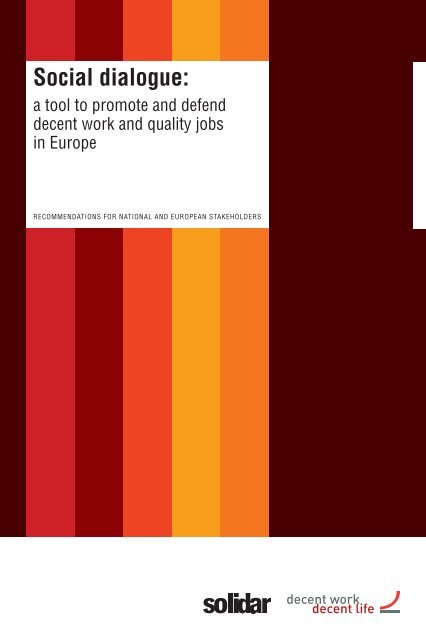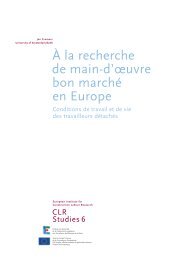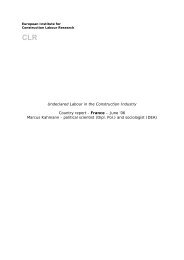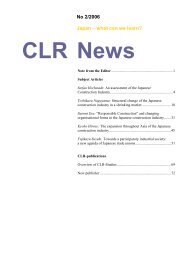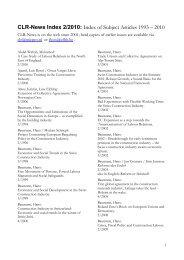SOLIDAR (2010): Social dialogue - Horus.be
SOLIDAR (2010): Social dialogue - Horus.be
SOLIDAR (2010): Social dialogue - Horus.be
Create successful ePaper yourself
Turn your PDF publications into a flip-book with our unique Google optimized e-Paper software.
<strong>Social</strong> <strong>dialogue</strong>:a tool to promote and defenddecent work and quality jobsin EuropeRECOMMENDATIONS FOR NATIONAL AND EUROPEAN STAKEHOLDERSdecent workdecent life
ContentsForewordIntroductionThe “Decent Workfor All” ProjectChallenges toDecent Work in EuropeCase Studies –Illustrating theChallenges to Decent Work<strong>Social</strong> Dialogueas a Tool to Promoteand Defend Decent WorkRecommendations03.04.05.05.07.09.13.
ForewordFor more than one year now we are in a deep financial and economic crisis, thesocial consequences of which are <strong>be</strong>ing felt not so much by higher skilledworkers as by those vulnerable groups which are already often threatened bymarginalisation from the labour market and social exclusion.Before the crisis started there were an estimated 19 million working poor inEurope, that is to say people who have jobs but whose jobs do not give themenough income to place them above the poverty line. In addition, over the pastdecade we have <strong>be</strong>en witnessing increasing num<strong>be</strong>rs of people in precariousjobs or with atypical contracts in Europe.The <strong>SOLIDAR</strong> project “Decent Work for All: A Key to Effective IndustrialRelations” looks at the efforts that governments, employers and trade unionscan do to safeguard or extend decent work around Europe (read more aboutthe project on page 05). Through the studies carried out by our project partners(briefings available on www.solidar.org) and a series of round tables - involvingsocial partners and representatives of governments, labour inspections, localauthorities and NGOs - recommendations and <strong>be</strong>st practice examples fornational and European stakeholders have <strong>be</strong>en produced and brought togetherin this booklet. Their implementation would need coordinated efforts by tradeunions and employers in the framework of social <strong>dialogue</strong>, enabling legal andpolicy frameworks at national and European level. Putting them into place wouldalso mean the involvement of governments and public authorities in a tripartitesetting.The concept of Decent Work is one which is predominantly applied to developingcountries and not to Europe. In Europe we generally talk about “quality workand employment”, a different term for essentially the same idea: everywhere inthe world, workers need a job which gives them enough salary to provide forthem and their families, a job which gives them holidays and decent workinghours, a job in which people can join a union to represent their rights, and a jobin which they are protected by individual and collective labour law.Finally, we would like to thank the Advisory Group and its Chair Jan Cremersfrom the Amsterdam Institute on Advanced Labour Studies (AIAS) for theirinvaluable support to the project.Let’s make this a reality for everyone, in Europe and around the world!Conny Reuter<strong>SOLIDAR</strong> Secretary General
IntroductionWhen the ILO launched the concept of Decent Work in 1999, it defined theprimary goal as <strong>be</strong>ing “to promote opportunities for women and men to obtaindecent and productive work, in conditions of freedom, equity, security andhuman dignity”. Since that time, <strong>SOLIDAR</strong> has <strong>be</strong>en working together with itsmem<strong>be</strong>rs, partners and allies in Europe and worldwide to promote DecentWork for a Decent Life for All.1Guideline 17 of the Integrated Guidelines2008-<strong>2010</strong> mentions the objective for Mem<strong>be</strong>rState’s policies of implementing employmentpolicies aiming at achieving full employment,improving quality and productivity at work, andstrengthening social and territorial cohesion,twice making reference to “quality of jobs”:http://register.consilium.europa.eu/pdf/en/08/st10/st10614-re02.en08.pdf2This dimension covers two core objectives forpromoting decent work: social protection andworkers rights3See European Foundation for the Improvementof Working and Living Conditions in Europe(2002): Quality of Work and Employment inEurope: Issues and Challenges. FoundationPaper No. 1. Dublin: Eurofound and PeñaCasas, Ramón (2009): More and Better Jobs:Conceptual Framework and MonitoringIndicators of Qualify of Work and Employmentin the EU Policy Arena. RECWOWE WP06/2009, http://www.ose.<strong>be</strong>/files/publication/rpenacasas/PenaCasas_0609_RECWOWE_WP.pdf4Cf.http://www.publications.parliament.uk/pa/cm200708/cmselect/cmeuleg/86/86.pdf,p.71. It is underpinned by a system ofindicators on 15 dimensions developed by theGerman Federal Trade Union Confederation(DGB) used at enterprise level since 2007, seehttp://www.dgb-index-gute-ar<strong>be</strong>it.de/ andhttp://www.verdi-gute-ar<strong>be</strong>it.de/Decent Work is a strategy to achieve sustainable development that is centredon people, a key element in building fair, equitable and inclusive societies. Thisstrategy is based on four key objectives:Equal access to employment for all, without discrimination, including equaltreatment, equal opportunities and a living wage;The respect of fundamental principles and rights at work and internationallabour standards (including the right of workers to organise and to representtheir interests collectively through trade unions);<strong>Social</strong> protection (protection from the reduction or loss of income) and socialsecurity;<strong>Social</strong> <strong>dialogue</strong> (including the right to <strong>be</strong> represented at different levels andtripartism).At the same time as the ILO was developing its decent work agenda, theEuropean Union launched the concept of Quality Work and Employment(QWE). At the European Commission meeting in Lisbon in spring 2000,improving job quality <strong>be</strong>came an explicit objective in the EU’s goal to <strong>be</strong>comethe most competitive and dynamic knowledge-based economy in the worldcapable of sustainable economic growth with more and <strong>be</strong>tter jobs and greatersocial cohesion.In 2001, QWE was introduced as a general horizontal objective in the EuropeanEmployment Strategy (EES), and later taken up in the Employment Guidelines 1 .The 10 dimensions of QWE were defined as 1) intrinsic job quality; 2) skills,lifelong learning, and career development; 3) gender equality; 4) health andsafety at work; 5) flexibility and security 6) inclusion and access to labourmarket; 7) work organisation and work-life balance; 8) social <strong>dialogue</strong> andworker involvement; 9) diversity and non-discrimination; 10) overall workperformance. The conceptual approach was further developed by the EuropeanFoundation for the Improvement of Working and Living Conditions in 2002 byidentifying four broad dimensions of job and employment quality: 1) careerand employment security 2 ; 2) health and well <strong>be</strong>ing; 3) skills; 4) reconciliationof working and non-working life 3 .Furthermore in 2007 the European Council stressed the importance of “goodwork”, meaning fair wages, safety and health protection at work, workers’rights to assert their interests, family-friendly organisation of work and asufficient num<strong>be</strong>r of jobs 4 .For <strong>SOLIDAR</strong> and our project partners decent work and quality work andemployment are two complementary concepts, aiming at safeguarding decentworking conditions for all in Europe.04.
The “Decent Work for All” ProjectThe <strong>SOLIDAR</strong> project “Decent Work for All: A Key for Effective IndustrialRelations” aims to create a <strong>be</strong>tter understanding of the link <strong>be</strong>tween decentwork for all in Europe and effective social <strong>dialogue</strong>, with a view to reinforcing theEuropean <strong>Social</strong> Model and highlighting the need to place decent work at thecentre of EU and Mem<strong>be</strong>r States’ policies, and to counteract the current financialand economic crisis.5For the results of these investigations, please see<strong>SOLIDAR</strong> Decent Work and Quality Jobs Briefingshttp://www.solidar.org/Page_Generale.asp?DocID=21774&la=1&langue=ENLooking in particular at sectors with higher incidences of precarious labour (e.g.construction, health and long-term care, cleaning) and more vulnerable groups(e.g. young people, undocumented migrants) in six European countries (Estonia,Germany, Lithuania, Romania, Italy, Sweden), <strong>SOLIDAR</strong> and its project partnersABF, ADO SAH ROM, DGB Bildungswerk, IRES, ISCOS and ANOLF, JMK andLLES compared the challenges that risk weakening decent work and social<strong>dialogue</strong>, like precarious working conditions and temporary agency work, at theEuropean, national, sectoral and enterprise level 5 . The project also looked into therole of social partners and the <strong>be</strong>nefits of collective agreements in fightingprecarious labour and promoting decent work and quality jobs and employment.As a result, good practice examples and recommendations, notably in the formof social <strong>dialogue</strong>, to address the challenges at both national and European levelhave <strong>be</strong>en produced and brought together in this booklet.Training and communication tools from the project:Case studiesSummary briefingsTraining manualPhoto exhibitionMaterials are available on www.solidar.orgChallenges to Decent Workin EuropeOver the last decade we have witnessed a rise in the num<strong>be</strong>r of atypicalcontracts and precarious working conditions across Europe, with about 19million working poor in Europe in 2008. Major trends which have contributedto shaping European labour markets over the last decade have included theimplementation of labour law reforms seeking to increase the internal andexternal flexibility of enterprises and administrations as well as a clear increasein labour migration within Europe - with the accession of 12 countries to the EU- and from non-EU countries. In addition, the deepening of European economicintegration has brought about new opportunities, but also generated new risksin view of the quality of work and employment, in particular for vulnerable andalready marginalised groups on the labour market and in society.
Case StudiesIllustrating the Challenges to Decent WorkRomania:Non-EU posted workers in the construction sector: uninformed, unprotectedand at the mercy of employer“It’s the employerwho makes the rulesand he doeswhatever he wants.”Chinese construction workerhired in China to work in Romania8Emergency Ordinance no. 56/2007 on theemployment and posting of foreign workersin RomaniaSince Romania joined the EU and adopted legislation on the employment offoreign workers 8 , there has <strong>be</strong>en a rapid increase in the num<strong>be</strong>r of workersfrom non-EU countries, amounting to more than 40% of total foreign workerswith individual employment contracts in 2008. Third country nationals postedby non-EU employers do not enjoy the same levels of protection as otherworkers however, and abuses occur. Workers feel uninformed, unprotectedand at the mercy of the employer. Labour inspection is weak, and the existingsystem means that inspectors are not able to fully monitor the conditions underwhich third country nationals are hired. In some cases employers takeadvantage of weaknesses in the law, or simply break the law in order to gaincompetitive advantage.“Our employers do not want to,do not know how and lack thetradition to negotiate.”Harri Taliga, Head of the EstonianTrade Union Confederation (EAKL)9See European Commission (2007)‘Towards Common Principles of Flexicurity:More and <strong>be</strong>tter jobs through flexibilityand security’ [COM(2007)359] of 27 June2007, p. 10,http://ec.europa.eu/employment_social/publications/2007/ke7807284_en.pdf10As highlighted by the <strong>2010</strong> Eurofoundpublication “Opening doors – the role ofsocial partners in fostering social inclusion”,social <strong>dialogue</strong> has a key role to play wheninstituting flexicurity strategies, given thatworkers in non permanent contracts orwith interrupted career paths, are at greaterrisk of in-work poverty and to prevent fromfurther segmentation of the work forceand labour marketsEstonia:Introducing flexicurity without social <strong>dialogue</strong>In Estonia, the basic principles of social <strong>dialogue</strong> were pushed aside when thegovernment adopted the new Employment Contracts Act (ECA) in 2009 withchanges it had introduced unilaterally, ignoring an earlier tripartite agreement.The ECA was supposed to introduce the notion of “flexicurity”, a strategy toenhance both, flexibility and security on the labour market. In reality howeverthe model provides flexibility, making it cheaper and easier for employers to layoff workers, without the security, reducing compensation while failing tosupport workers in the form of life-long learning or retraining.Flexicurity is an integrated strategy to enhance both flexibility and security on the labour market.This working definition by the European Commission 9 reflects a political approach aimed atcombining and simultaneously improving the flexibility of labour markets, work organisation andlabour relations, and security (employment security and social security. Its main componentsare: 1) flexible and reliable contractual arrangements, 2) effective active labour market policies,2) comprehensive life-long learning and 4) modern social security systems.It is important to highlight that the flexicurity concept was developed during phases of economicand employment growth in the large majority of EU mem<strong>be</strong>r states. There is a growingconsensus that it was not designed to address a num<strong>be</strong>r of recent structural challenges forlabour markets stemming from the current financial, economic and social crises, as also statedby László Andor, Commissioner for Employment and <strong>Social</strong> Affairs during a hearing at theEuropean Parliament on 14 April <strong>2010</strong>.Experience from across the EU shows that there are important preconditions for policies inspiredby flexicurity to function, most importantly effective social <strong>dialogue</strong> and strong, representativesocial partners - in particular trade unions at enterprise, sectoral and national level - thatgenerally no longer exist in most European countries 10 .07.
“I had to pay by all socialcontributions myself, althoughthey were supposed to <strong>be</strong> paidby the employer. I was alsoblackmailed, humiliated andthreatened, like a <strong>be</strong>ast.Now I pray to God to <strong>be</strong> lucky,find a permanent job andregularise my position onceand for all.”Migrant care workerItaly:Undeclared and unprotected migrant workers in the private welfare marketMany Italian families are turning to foreign family assistants to care for theirelderly relatives (caregivers, or ‘badanti’) and provide domestic help (maids)<strong>be</strong>cause of the limited supply of home care services. The carers are usuallywomen and most left their home countries to escape a difficult situation, oftenworking in Italy without a legal permit. They are highly vulnerable to exploitationin a sector where they are seen as a cheap and flexible solution. The professionis now officially recognised and protected by a national collective agreement,but a significant minority of workers remain in an illegal situation. Employersresist formally registering their employees <strong>be</strong>cause of both the initial costs andongoing social security costs.Italy:Discrimination against foreign workers in the construction sector“All my life I have worked, butthe employer doesn't recognisethis and hires me in anotherpay grade. Every day I losemoney; the engineer saysI don't care, I'm not interested.He gave me a grade 2 contract,even though I am qualifiedas a grade 7.”Romanian crane operatorForeign workers are an essential part of Italy’s construction industry, makingup about 17% of the workforce. They have <strong>be</strong>en exposed to discrimination,exploitation, and poor health and safety standards, as well as difficulties intheir social and cultural inclusion. Where trade unions have <strong>be</strong>en involved theyhave successfully negotiated specific measure to protect foreign workers incollective agreements. It is a difficult task however <strong>be</strong>cause many foreignworkers distrust the trade unions. Those most exposed to discrimination inworking conditions are workers without a residence permit, workers who arenot aware of their rights or who are willing to ignore them in exchange for animmediate economic return. The most common problems they face aredowngrading, lack of retirement <strong>be</strong>nefits and lack of severance pay. Foreignworkers are also frequently confined to the lower grades, perform the hardesttasks and are far more vulnerable to blackmail compared to Italian workers.Lithuania:Young people faced with high unemployment, low protection and little training“I found out, that in order toreceive the <strong>be</strong>nefits, I had towork for at least 18 months.If I had known that, I might havestuck it out a little longer atwork. I was left without a job or<strong>be</strong>nefits. The EmploymentOffice has not suggestedanother job in ticket sales.”Youth unemployment in Lithuania is the second highest in the EU according toEurostat, reaching 31.2% in August 2009, and continues to rise rapidly. Theprospects of young people finding a job via the labour exchange are minimalin the current economic climate, and the system has <strong>be</strong>en found to <strong>be</strong> unwieldyand ineffective. Only 10% of young workers are entitled to and receiveunemployment <strong>be</strong>nefit owing to the requirement to have worked 18 monthsout of the previous 36. State institutions have <strong>be</strong>en slow to respond to thecrisis in youth unemployment, and have done little in terms of support ortraining.Lina, 28, who was asked to leave“voluntarily” when the tourist officeshe worked in was closed down08.
<strong>Social</strong> Dialogue as a Toolto Promote and Defend Decent WorkIn each of the cases outlined above, good practices have <strong>be</strong>en identified and implemented to help address these situations,and meet the criteria for decent work. <strong>Social</strong> <strong>dialogue</strong> has played an essential role in strengthening the rules andregulations, and enforcement of those rules, to protect workers’ rights.Romania:The role of social <strong>dialogue</strong> in building decent jobs for third countryposted workersRomania’s construction sector has some well-developed social <strong>dialogue</strong>mechanisms. The ARACO Employers’ Confederation and the FAMILIA ‘AnghelSaligy’ General Federation of Trade Unions, the representative organisations inthe sector, are signatories to the 2008-2009 collective agreement inconstruction. The two organisations also concluded a sectoral social agreementfor 2007-2009, which set up a System of Sectoral Self-regulation inConstruction (SASEC). This system consists of:• A Builders’ <strong>Social</strong> Fund (providing compensation for periods of inactivity dueto bad weather).• A Builders’ Vocational House and Sectoral Committee on Vocational Training(whose tasks include linking the Romanian vocational training system tosimilar systems in Europe and developing a system of occupational standardsfor life-long learning).• A Builders’ Fund for Safety and Health at Work to build a system of training andauditing aimed at developing a package of services that should lead to theawarding of a certificate of good health and safety practices to constructionsites that meet the legal standards.• A Builders’ Holiday Fund to help reduce the cost for workers, particularly in thelow-earning winter season.• A Builders’ Pension Fund that collects and invests part of individual contributionsto the social insurance fund.Despite this support system, however, many non-EU posted workers are stillunprotected and open to abuse. To help tackle these problems the social partnershave set up bargaining committees. The SASEC has a bargaining committee forcombating undeclared work and another on the relationship <strong>be</strong>tween transnationaltrusts and domestic entrepreneurs. Finally, it has a bargaining committeefor migrant workers, which cooperates with the relevant public institutions,develops partnerships and concludes bilateral agreements <strong>be</strong>tween tradeunions/employers’ organisations and similar organisations in the countries oforigin, helps foreign workers join trade unions and ensures the observance offoreign workers’ rights and obligations while employed in Romania.Lobbying in partnershipTrade unions and NGOs haveworked together to lobby tochange legislation. Three tradeunion confederations, the NationalTrade Union Confederation CartelALFA, the National Free TradeUnion Confederation in RomaniaFRATIA and the National TradeUnion Block BNS, together withthree NGOs, ARCA the RomanianForum for Refugees andMigrants, the Group for DialogueInitiative and the Association forOrganisation Development – SAHROM, submitted a report to theRomanian government to urgeactive involvement in theverification of the implementationof legislation to protect non- EUworkers to tackle the weaknessesin both law, notably the lack ofclear provisions on the legalterms and conditions ofemployment of non-EU workersand practice, such as the failureto observe the initial agreementwith the worker and the lack ofinformation in a language theycan understand.The structures developed under the sectoral social agreement are operational,have their own staff, and implement projects funded by EU’s PHARE andLeonardo Da Vinci programmes, the European <strong>Social</strong> Fund, and the InternationalLabour Organisation (ILO), and cooperate with similar foreign institutions. Theyare particularly important in terms of their potential with regard to therepresentation and protection of migrant workers.09.
11For reference to the Danish model and forfurther reading see <strong>SOLIDAR</strong> report onflexicurity and labour market inclusionservices, http://cms.horus.<strong>be</strong>/files/99931/MediaArchive/FIC-<strong>SOLIDAR</strong>-Seminar-Flexicurity-Report.pdf12http://www.ekspress.ee/2008/01/28/arvamus/812-muinasjutt-euroopalikusteelnoust“The European principleof flexicurity must <strong>be</strong> takeninto account, evenly balancingthe rights and obligationsof employees, employersand the Government.”<strong>Social</strong> Democratic Party of Estonia“Estonian labour legislationcan <strong>be</strong> transformed towardsflexicurity only if the legislatorshows more trust in theagreements <strong>be</strong>tween employeesand employer federations.”<strong>Social</strong> Democratic Party of EstoniaEstonia:Employment Contracts Act – the essential role of social <strong>dialogue</strong> in ensuringFlexicurityEstonia’s revised Employment Contracts Act (ECA) is an illustration of howignoring social <strong>dialogue</strong> can lead to serious failings. The ECA, which introducedthe notion of flexicurity into employment relationships, was initially based onthe successful Danish model 11 . Although Estonia’s draft legislation was drawnup on the basis of tri-partite negotiation, the final version ignored the views ofthe social partners, particularly the trade unions, and failed to provide workerswith any real security. The Danish model provides an income of up to 90% ofprevious earnings for the unemployed and includes, vitally, a high level ofinvestment in the workforce through education and life-long learning. Strongsocial <strong>dialogue</strong> is a key element of the system in Denmark, where 80% ofemployees are trade union mem<strong>be</strong>rs, and social partners were consulted ateach step of the reform. It was thanks to strong social cooperation that thereduction in unemployment brought about by these measures did not lead toa drop in wages. The Danish system provides both a sense of security for theemployee and for the economy’s competitiveness. The system has not workedso well when transferred to Estonia however, largely <strong>be</strong>cause some elementsare missing, due principally to a failure to respect social <strong>dialogue</strong>.Katrin Saks, one of the leaders of the Estonian <strong>Social</strong> Democratic Party, notesfor example that Estonia does not invest so heavily in adult education and lifelonglearning as Denmark does. Estonian statistics show that only 6-7% takepart in adult continuing education, which is one of the lowest figures in theEuropean Union 12 . The key roles of social <strong>dialogue</strong> and social partnership musttherefore <strong>be</strong> recognised as necessary preconditions to provide workers withsecurity and enable the flexicurity model to work. Issues related to labour lawand employment policy reforms should <strong>be</strong> resolved through tripartitenegotiations.13Domestic workers in Italy are representedby a num<strong>be</strong>r of trade union groups,namely: the Italian Federation ofCommercial, Tourism and ServiceWorkers (FILCAMS-CGIL), the ItalianFederation of Service, Commerce andTourism Workers (FISASCAT-CISL), theItalian Tourism, Commerce and ServicesWorkers’ Union (UILTuCS-UIL), andFEDERCOLF – Domestic Employees’Federation. Their counterparts on theemployers’ side are: FIDALDO – theItalian Federation of Domestic Employersand DOMINA – the National Associationof Domestic EmployersItaly:<strong>Social</strong> <strong>dialogue</strong> – a national collective agreement to protect care workersIn 2007 the social partners in the domestic and service sector - four trade uniongroups and two employers’ groups 13 - came together to negotiate a nationalcollective agreement for all domestic workers and family assistants, regardlessof their union mem<strong>be</strong>rship, giving them a legally recognised professionalstatus. The minimum wage for family assistants increased by an average of30% after the introduction of the collective agreement.The collective agreement that came into force on 1 March 2007 makes a cleardistinction <strong>be</strong>tween domestic workers and family assistants/carers. Theagreement divides the jobs into eight categories, specifying duties,qualifications etc. for each level, <strong>be</strong>ginning at the basic level A for domesticworkers with no experience. A salary level is assigned to each category whichthe parties cannot go <strong>be</strong>low, which is effectively a minimum wage set by thesocial partners for a specific professional group.10.
The collective agreement also sets out maximum working hours. Any timeworked above those hours must <strong>be</strong> paid as overtime. The employment contractmust also foresee paid time off for vocational training, rules for job sharing andseverance pay. Employment contracts must indicate working hours, vacations,the weekly day off and half-day off. They must also specify many other detailssuch as whether night assistance is required, the trial period, overtime pay, andboard and accommodation. Workers are also entitled to social security <strong>be</strong>nefitsincluding unemployment <strong>be</strong>nefit, sickness insurance, occupational accident orillness insurance, and maternity and family leave.There is still a significant minority of undeclared workers, however, who remainoutside the system and therefore do not enjoy protection 14 . Some initiativeshave <strong>be</strong>en introduced to further encourage regularisation, including “WindowOffices” for matching demand (families) and supply (migrant workers). Theyoffer counselling on regularisation procedures and contracts, a service that islacking on the black market. There is also a system of care-vouchers for peoplehiring a regularised family assistant. Some regions grant financial support in theform of a care-voucher for the elderly who hire a family assistant. The voucheris tied to the hiring of a family assistant who must <strong>be</strong> regularised. Success sofar has <strong>be</strong>en limited however, as the financial incentive is not yet high enoughcompared to the cost of social security contributions that regularisation entails.14A government regulation called theSanatoria (regularisation procedure) wasimplemented for one month in Septem<strong>be</strong>r2009 to allow family assistants anddomestic workers to apply for apermanent residence permit, but not allemployers were prepared to pay the 500euro lump sum and subsequent socialsecurity charges. Fewer than 300,000applications were received out of anexpected 700,000Italy:Building decent jobs for migrant workers based on collective agreementsThrough a series of initiatives, including organising and mem<strong>be</strong>rship drives,information campaigns, services such as specialised counselling and offices, theprotection of workers in the event of industrial disputes, the establishment of amigrant workers’ delegate and Italian language courses, foreign workers are<strong>be</strong>ginning to join the trade unions in increasing num<strong>be</strong>rs, with 20,000 newmem<strong>be</strong>rs joining in 2008 alone.At the local level, the trade unions have in recent years successfully negotiatedto include specific measures into collective agreements aimed at integratingand protecting foreign workers, including vocational, literacy and health andsafety training 15 . Some examples of such agreements at the local level are:• Training to improve workplace safety, <strong>be</strong>ginning with signs at the workplacein the workers’ languages.• Training to improve social and working conditions.• Training for new workers entering the sector, literacy training, vocationaltraining and safety at work.• A regional round table to find resources for tackling the problems of foreignworkers.• Organising holidays to take into account the need of foreign workers to returnto their country of origin, including longer holiday periods; action with thepublic administration to meet the housing needs of workers.• Specific courses designed for foreign workers in the Italian language, healthand safety etc.• Courses for the recognition of professional skills, distribution of multilingualinformation to ease the social integration of foreign worker.15The <strong>2010</strong> Eurofound publication“Opening doors – the role of socialpartners in fostering social inclusion”elaborates on the specific challenges asto working conditions for migrants,especially third-country migrants, and therole social partners can play inaddressing them, confirming manyfindings under this project. It states that“that migrant workers employed inunskilled jobs in traditional sectors (suchas agriculture and construction ) or in theinformal economy as a rule are excludedfrom training, counseling and supportinitiatives that are targeted at skilledmigrants or at unskilled workers in large,more heavily unionised companies whoalready <strong>be</strong>nefit from social protection”(p. 15)“Knowing one's rightsis the most effective toolto fight or at least limitthe problems facedby foreign workers inthe construction sector.”Italian trade union official11.
The 2008 national collective agreement for the construction industry alsocontains specific measures to protect foreign workers, including:• Vocational training.• Training courses to improve linguistic and intercultural comprehension<strong>be</strong>tween workers of different nationalities.• Training in the organisation and management of the construction site.• Training to prevent injuries.“We often work together withother national trade unionyouth organisations, for exampleon organising the Decent WorkCampaign, taking part togetherin demonstrations and in jointtraining activities. Our role isto promote youth activitieswithin the national trade unioncentres and to get the youthvoice heard in trade unionstructures.”Edita Zitkevic,coordinator for LPSK YouthLithuania:Organising young peopleUntil recently, there were very few young people in trade unions in Lithuania.Young workers have traditionally worked in service sector jobs where therehas <strong>be</strong>en little or no trade union representation. Furthermore, with many elderlyleaders from the old soviet era, the unions were perceived as <strong>be</strong>ing too oldfashioned and failing to defend the interests of youth. Yet they clearly neededan organised force to protect their interests in the wake of the financial crisis,mounting levels of youth unemployment, and the failure of national institutionsto address the issue.Three national trade union centres decided to establish national youthorganisations: Lithuanian Trade Union Confederation (LPSK) Youth, LithuanianLabour Federation (LDF) Youth Organisation and Lithuanian Trade Union‘Solidarumas’ Youth. They bring together mem<strong>be</strong>rs from 14 to 35 years of age,representing young workers’ professional, labour, economic and social rightsand interests. Their main goals are:• To represent the interests of mem<strong>be</strong>rs in relations with employers and stateinstitutions.• To make proposals to social partners when discussing youth-relatedlegislation.• To explain Lithuanian laws to their mem<strong>be</strong>rs and train them in how to uselegislation.• To promote youth civil activeness.• To cooperate with other youth organisations in Lithuania and abroad.The Lithuanian Service Sector Workers’ Union (LPSDPS), a mem<strong>be</strong>r of the LPSK,stands out as a dynamic example of youth organising. Over 60% of its mem<strong>be</strong>rsare under 30. The LPSDPS team has achieved rapid mem<strong>be</strong>rship growth. Thebranch union started its activities in the UAB Lithuania Statoil workers' tradeunion, with 400 mem<strong>be</strong>rs. It now represents 5,000 workers from a wide rangeof sectors including transport, security, the gaming industry, catering, etc.Aleksandras Posochovas, chairman of LPSDPS, outlines the strategies used toensure this mem<strong>be</strong>rship growth. They include active grassroots organising, thetargeting of young individuals and legal representation to protect union mem<strong>be</strong>rsagainst reprisals. The union also <strong>be</strong>nefitted from international training, drawinga lot of inspiration from the Nordic model.12.
RecommendationsThe following recommendations on how to improve working conditions in the framework of social <strong>dialogue</strong> and <strong>be</strong>yondare made to national and European stakeholders to address the challenges of precarious labour and to promote decentwork across Europe.To national governments• Strengthen the role of collective bargaining as a instrument to 1) guarantee equal treatment for workers in terms ofcareer development, wages, security; 2) overcome discrimination; 3) attain inclusion and full participation in society forall citizens; 4) promote intercultural education.• Strengthen the capacities of trade unions as a social partner to allow them for effective preparation/informationgathering, joint trade union positions, information to mem<strong>be</strong>rs, and training mem<strong>be</strong>rs in how to fight for their rights.• Intensify and improve the workers’ voice in our economies, not least by the extension of information, consultation andco-decision rights at all levels (company, national, European, global)• Establish a legal system of social responsibility and liability in production and subcontracting chains• Enforce and strengthen sanctions against employers who fail to respect workers’ rights.• Foster a multi-stakeholder approach that also involves social NGOs that represent the most vulnerable sectors of societyto promote the full inclusion and participation in society of people on the fringes of or outside the labour market.• Reform social law, extending social <strong>be</strong>nefits and improving professional training.• Put more resources into measures to keep people in work and provide life-long learning.• Fully respect and implement international agreements on the rights of migrant workers, in particular ILO Convention97 on Migration for Employment, ILO Convention 143 on Migrations in Abusive Conditions and the Promotion of Equalityof Opportunity and Treatment of Migrant Workers and UN Convention on the Protection of the Rights of all MigrantWorkers and Mem<strong>be</strong>rs of their Families.• Fully respect ILO Conventions 87 and 98 on the right to organise and collective bargaining, including the right to strike.• Ratify ILO Convention 181 on Private Employment Agencies; establish stricter rules for and improve control ofrecruitment agencies.To public authorities/labour inspectors• Introduce the compulsory licensing of recruitment agencies with clear requirements; implement strict monitoring ofcompliance with the rules and impose effective sanctions on employers who break the rules.• Increase the accountability of temporary employment agencies.• Ensure a more effective monitoring of the activity of private recruitment companies outside the receiving countries.• Put an end to the practice of charging potential employees with a consultancy fee.• Make labour inspections more effective, and give inspectors the right to assess whether an enterprises financial situationgenuinely requires staff cuts, salary cuts or shorter working hours.• Give the labour inspectorate greater authority to prevent unfair dismissals and other breaches of employment contractsand assess whether decisions on expenditure or for other motives have impaired health and safety conditions.• Enforce and strengthen sanctions against employers who fail to respect workers’ rights.13.
To social partners• Strengthen the role of collective bargaining as an instrument to 1) guaranteeequal treatment for workers in terms of career development, wages, security; 2)overcome discrimination; 3) improve equal inclusion and full participation insociety; 4) promote intercultural education.• Negotiate more vocational training for migrant family assistants.• Aim at extending - in a mid-term perspective - collective agreement initiativesseeking to foster workplace integration to all migrants.• Better inclusion of migrant workers employed in unskilled jobs in traditionalsectors (such as agriculture and construction) in the informal economy or inless unionised enterprises by training, counselling and support initiatives andwith policies and programmes particularly targeted at their needs and takingaccount of their specific working and employment conditions.• Negotiate retraining/reskilling at the cost of the employer.• Negotiate vocational training for employers too, in workplace health and safetyand quality employment, particularly in the construction sector.• Fight for the interests of and work towards the social inclusion of employees invulnerable positions, even in cases of low trade union mem<strong>be</strong>rshipTo European institutions• Expand EU posting of workers’ rules to workers from third countries posted bynon-EU undertakings.• Adopt a single procedure for the issue of a single permit to reside and work inMem<strong>be</strong>r States for posted workers from Mem<strong>be</strong>r States and third countries,accompanied by a common set of rights for all migrant workers.• Ensure enhanced cooperation with third countries in order to set up an effectivesystem for matching employment supply and demand.• Promote the adoption of ILO Convention 181 Private Employment Agencies andConvention 97 on Migration for Employment among the Mem<strong>be</strong>r States.• Consider the introduction, at European level, of a licensing system for theproviders of recruitment and placement services.• Intensify the fight against the cross-border exploitation of workers by bogusgang masters and agencies.• Work out a system of mutually recognised joint and several liability insubcontracting chains, entailing that contracting agencies shall <strong>be</strong> liable forobligations of contractors further down in the chain of sub-contracts to paywages pursuant to collective agreements that have <strong>be</strong>en declared generallyapplicable in order to prevent the abuse of employees’ rights, the erosion of therules and to combat undeclared work.• Include into the Commission Guide on <strong>Social</strong>ly-responsible Public Procurementexpected for the first half of <strong>2010</strong> should include a recommendation to extend allprovisions related to socially-responsible public procurement to subcontractorstoo. They should <strong>be</strong> included in the tenderers’ offer and presented in alldocuments related to labour law legislation in the offer (especially those relatedto health and safety at work) during the award procedure.• End the uncritical application of the concept of flexicurity and the commonprinciples on flexicurity in EU Mem<strong>be</strong>r States where the guarantees for thesecurity part of this concept in view of creating quality jobs backed up effectivesocial <strong>dialogue</strong> and strong welfare systems are absent.Advisory GroupCHAIRPERSON:Jan CremersAmsterdam Institute onAdvanced Labour Studies (AIAS)MEMBERS:Claudia BogedanHans-Böckler-Stiftung (HBS)Rudi DelarueInternational Labour Organisation(ILO)Ronald JanssenEuropean Trade UnionConfederation (ETUC)Janine LeschkeEuropean Trade Union Institute(ETUI)Ramón Peña CasasO<strong>be</strong>rvatoire <strong>Social</strong> Européen(OSE)Richard PondEuropean Public Service Union(EPSU)Frank Sie<strong>be</strong>rn-ThomasEuropean CommissionDG Employment, <strong>Social</strong> Affairs,Equal OpportunitiesStefan ThalhoferFriedrich-E<strong>be</strong>rt Stiftung (FES)14.
Aboutthe project“Decent Work for All: A Key forEffective Industrial Relations”is a one-year project which aimsto produce recommendationson how to improve workingconditions around Europe insectors with higher incidencesof precarious working conditions(ie construction, health and longtermcare) and more vulnerablegroups (ie youth, undocumentedmigrants) through coordinatedefforts by governments,employers and trade unions inthe framework of social <strong>dialogue</strong>.It also looks into the role of socialpartners in fighting precariouslabour and promoting decentwork and quality jobs.All “Decent Work for All: A keyfor Effective Industrial relations”briefings are available onwww.solidar.org
<strong>SOLIDAR</strong> is a European network of NGOs workingto advance social justice in Europe and worldwide.<strong>SOLIDAR</strong> voices the concerns of its mem<strong>be</strong>rorganisations to the EU and international institutionsacross the policy sectors social affairs, internationalcooperation and lifelong learning.Responsible Editor: Conny ReuterEditor: Sara HammertonProject Coordinators: Mauro Striano andMathias MaucherPublication Coordinator: Abigail Goundry<strong>SOLIDAR</strong>Rue du Commerce | Handelsstraat 221000 Brussels - BelgiumT +32 2 500 10 20F +32 2 500 10 30E solidar@solidar.orgwww.solidar.orgPrinted on recycled paper | © <strong>SOLIDAR</strong> May <strong>2010</strong>This publication has <strong>be</strong>en produced with the assistance of the European Union. The content of this publicationis the sole responsibility of <strong>SOLIDAR</strong> and can in no way <strong>be</strong> taken to reflect the views of the European Union.


